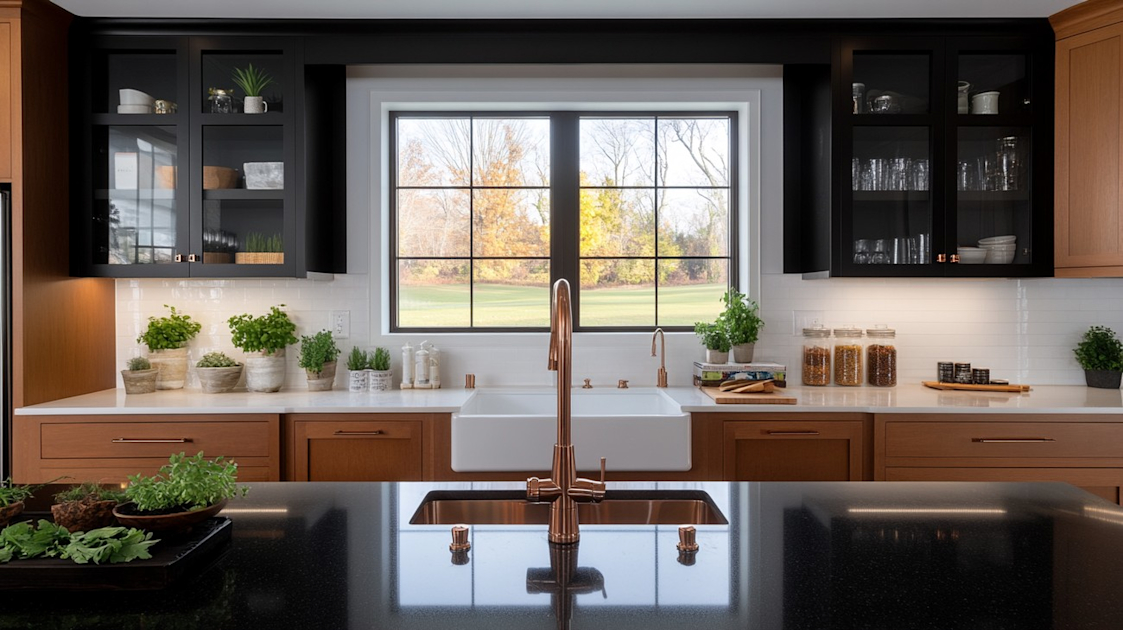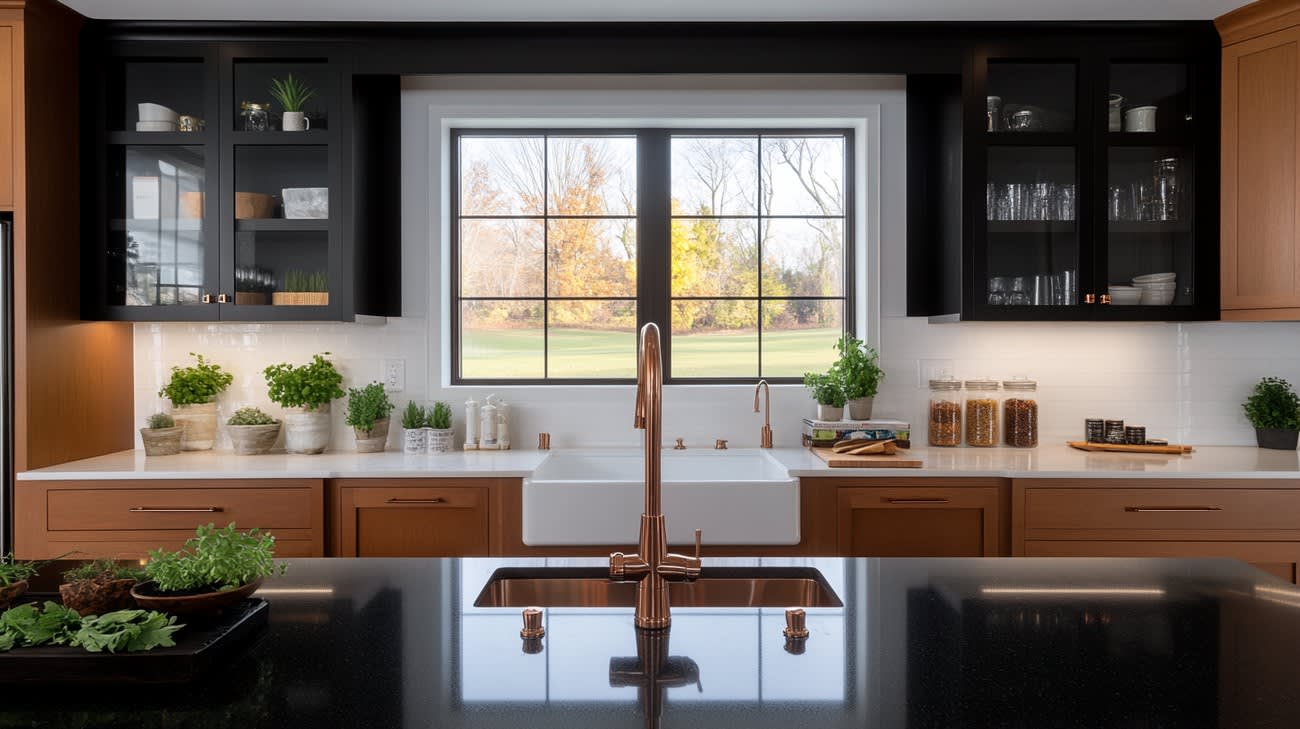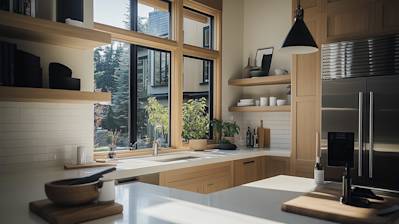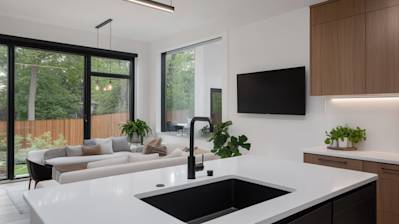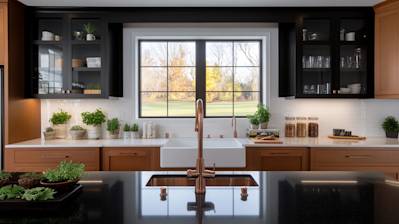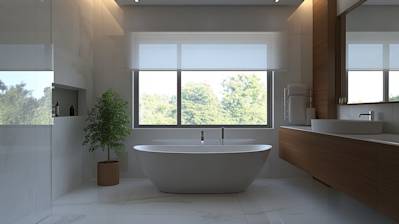Successful kitchen DIY projects require ample knowledge of kitchen sink plumbing. Not only can you address any issues that may arise, but you can also keep your modern kitchen sink operating smoothly to prevent potential problems.
This blog post unravels the often complicated sphere of kitchen sink plumbing, guiding you on all there is to tackle, from the basics to draining issues to maintenance guidelines.
Kitchen Sink Plumbing Essentials
The complexity of your kitchen sink plumbing can be mind-boggling, but understanding its core components can simplify the whole process. Here are the key elements:
- Sink drain: This connects the sink to the P-trap.
- P-trap: A crucial part of kitchen sink plumbing, this component catches debris, preventing them from causing blockages elsewhere.
- Waste arm: This pipe leads to the wall from the P-trap.
Knowing these will make it easier to make necessary adjustments and identify any potential hitches.
Essential Tools for Kitchen Sink Plumbing
Having the right tools can end the relentless wonders of "how to install kitchen sink plumbing?" Here are a few must-haves:
- Adjustable wrenches
- Hacksaw
- Plunger
- Drain snake
- Plumber's putty
- Pipe wrench
- Pipe sealant
- Plumber's tape
Ensure you have these tools on hand for a successful kitchen sink plumbing project.
Tackling Kitchen Sink Plumbing Issues
While they may seem intimidating, many kitchen sink plumbing issues are merely straightforward problems that can be fixed with a few know-how details.
Clogged Drains
Arguably the most common issue with kitchen sinks, a clogged drain can be frustrating to handle. Often, it's due to food residue, grease, or even foreign items lodged somewhere along the drainage line.
To fix this, try plunger-assisted unclogging, or use a drain snake if it proves stubborn. With repeated efforts, the kitchen sink will be back to its optimal self.
Leaking Faucet
Often resulting from worn-out components, a leaking faucet might necessitate a new faucet installation or a simple component change. Identifying the cause helps you determine whether you need to replace the entire faucet or just certain parts.
Maintaining & Updating Your Kitchen Sink Plumbing
Here are tips to maintain and modernize your kitchen sink plumbing:
- Regular upkeep: Clean your sink regularly, avoid dumping grease in it, and occasionally run hot water to flush out debris.
- Updates: Updating your faucet, installing a water filter system, or going for a touchless kitchen faucet can significantly enhance your kitchen sink plumbing.
- Timely repairs: Deal with leaks and blockages immediately before they lead to more substantial issues.
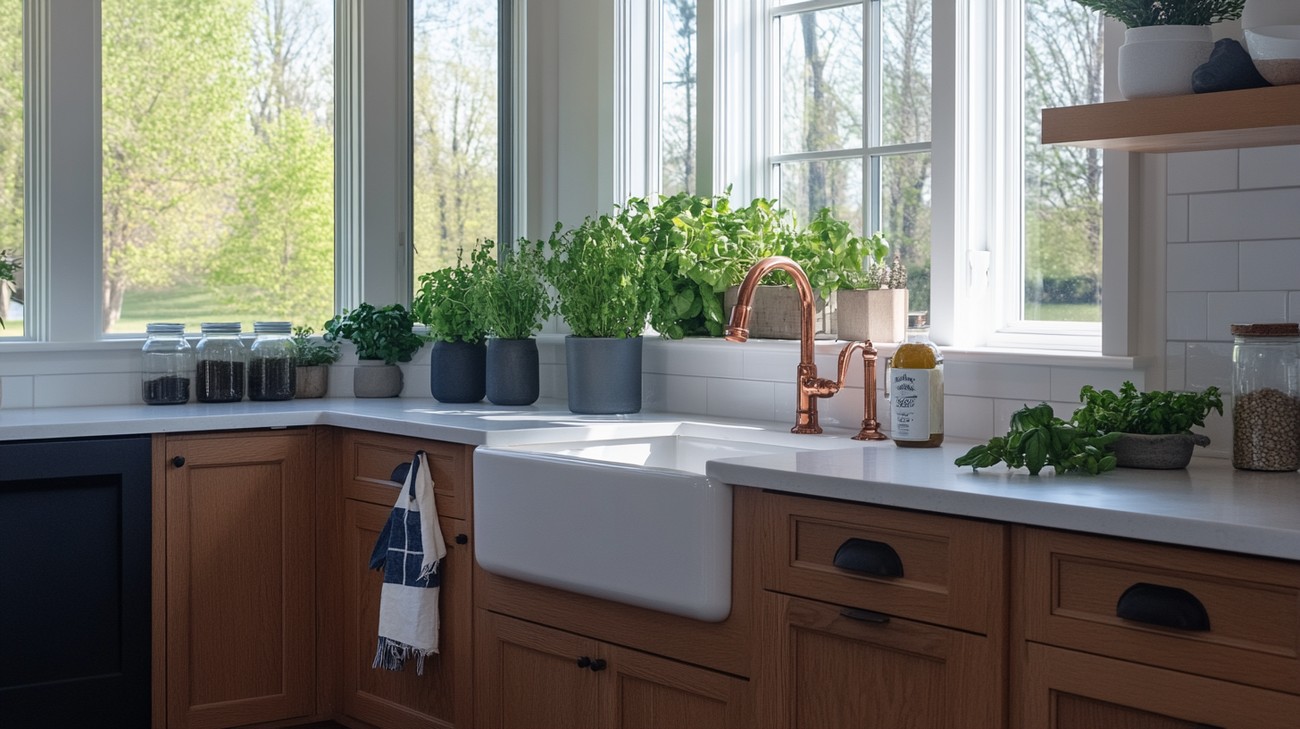
Frequently Asked Questions about Kitchen Sink Plumbing
What Determines the Type of Kitchen Sink Plumbing I Need?
Your choice of kitchen sink plumbing is influenced by several factors such as:
- Size, configuration and material of the sink.
- Existing plumbing setup in your home.
- Intended function or use of the sink (i.e., washing dishes, cleaning food).
- Your budget and aesthetic preferences.
It’s wise to consult with a licensed plumber who can assess these factors and guide you in choosing the appropriate kitchen sink plumbing.
Why Does My Kitchen Sink Drain Smell Bad?
Bad smells from your kitchen sink drain can be the result of food particles and grime buildup in the pipe. The smell indicates a need for cleaning the pipe or perhaps a deeper issue such as a blocked vent pipe or a faulty sewer line. Regular kitchen sink plumbing maintenance can help prevent such issues.
How Can I Maintain My Kitchen Sink Plumbing?
Regular plumbing maintenance can help you prevent kitchen sink issues. Here are a few tips:
- Avoid dumping grease or oil down the drain as it can solidify and cause clogs.
- Use a strainer to catch food particles and prevent them from clogging the pipes.
- Regularly clean your drain with vinegar, baking soda, and hot water.
- Consider a professional plumber for an annual plumbing inspection and maintenance.
How Do I Unclog My Kitchen Sink?
There are several ways to unclog a kitchen sink. You can start with a plunger, a plumber’s snake, or a hand auger. If these don’t work, home remedies using vinegar and baking soda or a commercial drain cleaner can be used. If the clog persists, you may need the services of a professional kitchen sink plumbing specialist.
Can I Replace The Faucet in My Kitchen Sink Myself?
Yes, replacing a kitchen sink faucet is achievable for a handy homeowner. It typically involves turning off the water supply, removing the old faucet and installing the new one following the manufacturer’s instructions. Keep in mind though that mistakes can lead to leaks and water damage. Thus, if you're unsure, hiring a professional kitchen sink plumbing service is advisable.
How Long Does Kitchen Sink Plumbing Last?
The life expectancy of kitchen sink plumbing depends on the materials used and how well it is maintained. On average, kitchen sink pipes can last between 20 to 70 years, while faucets can serve you effectively for 15 to 20 years. Regular inspections and maintenance can help extend the lifespan of your kitchen sink plumbing.
What Can I Do if My Kitchen Sink Plumbing Leaks?
The first step when you notice a leak in your kitchen sink plumbing is to turn off the water supply to prevent further water damage. Then, try to determine the source of the leak. It could be from the faucet, drain pipe, or supply line. Depending on where the leak is and your preference, you can attempt a DIY fix or hire a professional plumber.

Pros of Kitchen Sink Plumbing
Efficiency and Functionality
One notable advantage of kitchen sink plumbing is the efficiency and functionality it offers. Modern plumbing designs mean that the water flow is efficient and waste disposal is advanced. Cutting-edge technology has facilitated the creation of garbage disposals and dishwashers that make cleaning tasks easier and more manageable.
Durability
Kitchen sink plumbing, particularly when done professionally, often comes with durability as it's made of robust materials. Stainless steel, brass, and PVC are among the commonly used materials in kitchen sink plumbing, which are known for their durability and resistance to wear and tear.
Less Maintenance
Due to their durability, these materials require less maintenance, which will save homeowners time and money in the long run.
Economical
Once installed, kitchen sink plumbing can last for decades, making it a cost-effective choice. Although the upfront cost might seem hefty, the long-term gains, considering the years of service it provides, makes it an economical choice.
Enhances the Aesthetic Value
Modern plumbing fixtures and fittings can enhance the aesthetic value of your kitchen. Contemporary kitchen sink designs often include sleek faucets and polished drain pipes that add a touch of elegance to the space.
Cons of Kitchen Sink Plumbing
Installation Challenges
While professional installation can ensure longevity and function, improper installation can lead to numerous challenges. These can range from regular leaks to outright plumbing disasters. Hence, kitchen sink plumbing installation may require the services of a qualified plumber, which may increase the cost.
Regular Maintenance is Essential
Despite being built from robust materials, kitchen sink plumbing systems aren't entirely free from wear and tear. It's crucial to carry out regular maintenance and inspection to prevent disasters such as leaks or burst pipes. If not done regularly, minor issues can escalate to significant problems that may require costly repairs.
Replacement Cost
Replacing a kitchen sink plumbing system can be expensive, particularly if the system has reached the end of its service life. The cost may include the purchasing of new parts and the labor involved in fitting them.
Limitation in Design Choice
While there are diverse kitchen sink designs to choose from, your choice may be limited depending on the configuration of your plumbing system. Certain layouts or structural limitations of your home may limit the kind of sink design you can install, potentially hindering your dream kitchen design.
Dealing with Clogs
One of the most common problems with kitchen sink plumbing is clogs. Food debris, grease, and other solid wastes can build up in the pipes over time. While plungers and chemical drain cleaners can often resolve the issue, stubborn clogs may require the services of a professional plumber. In the worst-case scenario, you might have to replace the entire piping system.
Mould and Bacteria
Another con to consider is that your kitchen sink can be a breeding ground for germs if it's not cleaned regularly. Food remains and moisture can stimulate the growth of mould and bacteria, which can impact the health of the household. Thus, maintaining cleanliness is absolutely essential.

Myths and Misconceptions about Kitchen Sink Plumbing
When it comes to plumbing, especially kitchen sink plumbing, there are a handful of myths and misconceptions that are surprisingly prevalent. These misconceptions can sometimes lead to costly repairs or replacements. If you're looking to maintain your kitchen plumbing wisely, it's essential to get your facts straight, and debunk these misconceptions.
Myth: Lemons Clean Your Garbage Disposal Pipes
Putting lemon peels in your garbage disposal might make your kitchen smell better temporarily, but they are not really cleaning anything.
Fact:
Lemon peels and other citrus fruits are weak acids and will not eliminate the grease, oils, or sticky substances stuck in your disposal. This method might mask any unpleasant odors, but it certainly doesn't clean the pipe. To clean your garbage disposal, a mixture of warm water, vinegar, and baking soda should do the trick.
Myth: Running Water While Using the Garbage Disposal Helps the Waste Travel Smoothly
Many people believe that by running water while the garbage disposal is functioning will help the waste pass through the pipes smoothly.
Fact:
Not all types of waste can be easily broken down, even with running water. Grinding hard substances such as egg shells or bones will still damage the disposal blades, and greasy or stringy materials can clog the pipes regardless of how much water is used.
Myth: You Can Clean Everything with a Plunger
Unarguably, a plunger can be a handy tool for unclogging toilets, but they may not always work for kitchen sinks.
Fact:
Plungers might not provide enough force to remove heavy blockages in your sink, especially those caused by hardened grease or substantial food waste. Understanding the nature of the blockage and using the right equipment is crucial for successful unclogging.
Myth: In-Tank Toilet Cleaners Take Care of All the Cleaning
There’s a popular belief that in-tank toilet cleaners will keep your toilet sparkling clean without any additional work.
Fact:
In reality, these cleaners primarily bleach the toilet bowl to make it look cleaner. They do not kill all the bacteria or clean the hidden parts of the toilet, such as the rim holes. Regular scrubbing and cleaning are still required.
Myth: All Plumbers are the Same
This misconception can lead to unnecessary expenses if you hire an underqualified plumber to handle your kitchen sink plumbing issues.
Fact:
Just like any profession, the level of experience, knowledge, and skills can vary greatly among plumbers. Always do your research, read reviews, and if possible, opt for a licensed plumber.
Myth: Plumbing Fixtures Don't Require Regular Maintenance
A prevalent myth is that once installed, plumbing fixtures require no maintenance until a problem appears.
Fact:
Just like any other home appliance, regular maintenance is key to detect minor issues before they become major problems. It also helps prolong the life of your plumbing fixtures.
Myth: Tightly Securing Plumbing Fixtures Prevents Leaks
Some homeowners believe that tightly securing their plumbing fixtures will prevent leaks.
Fact:
Over-tightening fixtures, including those in the kitchen sink, can strain the pipes or cause the fixture itself to crack over time, leading to leaks. The best practice is to secure fixtures snugly, but not overly tight.
By dispelling these kitchen sink plumbing myths, homeowners can better maintain their plumbing system, saving money and avoiding significant repair issues.
Summary
Sure, a kitchen sink is nothing without proper plumbing. Skilled professionals or a DIY enthusiast accomplish effective kitchen sink plumbing using a blend of the right tools and procedures. Good plumbing ensures the durability of the sink and makes daily kitchen activities effortless. Proper maintenance is also crucial as kitchen sink plumbing requires regular checkups to ensure everything is functioning seamlessly and there are no inconveniences happening due to blockages or leaks.
One cannot overlook the importance of well-done kitchen sink plumbing. It isn't merely about connecting pipes; it's about assuring a hygienic and effective workspace in your kitchen. Consider whether your plumbing caters to the garbage disposal system. Ponder if the system is leak proof. Regular checkups and maintenance are the keys to avoiding major mishaps, leading to costly repairs. The better the plumbing, the longer your kitchen sink lasts.
Although people often overlook kitchen sink plumbing, it's an essential element of a functional kitchen. Without such plumbing, a beautiful and well-planned kitchen would be no more than a hollow shell. Be it washing dishes, preparing a meal, or even a quick clean-up after supper, it all comes down to how well your sink is plumbed. Therefore, a well structured and maintained plumbing system will ensure that your kitchen tasks proceed without a hitch.
About KYPD Plumbing
KYPD Plumbing is a trusted and reliable plumbing company based in Lexington, KY. We are your go-to team for all your plumbing needs. Our skilled plumbers have years of experience tackling a wide range of plumbing issues, from leaky faucets to full-scale construction projects. Our commitment to excellence ensures we get the job done right the first time, every time. We believe in providing excellent customer service and pride ourselves on our professional, punctive, and friendly approach. For quality seamless service that keeps your pipes flowing smoothly- choose KYPD Plumbing.
Tags: kitchen sink, plumbing, installation,

